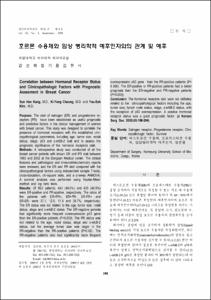호르몬 수용체와 임상 병리학적 예후인자와의 관계 및 예후
- Keimyung Author(s)
- Kang, Sun Hee; Chung, Ki Yong; Kim, You Sah
- Department
- Dept. of Surgery (외과학)
- Journal Title
- 대한외과학회지
- Issued Date
- 2003
- Volume
- 65
- Issue
- 3
- Abstract
- Purpose: The stati of estrogen (ER) and progesterone receptors (PR) have been established as useful prognostic and predictive factors in the clinical management of women with breast cancer. This study was designed to correlate the presence of hormonal receptors with the established clinicopathological parameters, including age, tumor size, nodal status, stage, p53 and c-erbB-2 stati and to assess the prognostic significance of the hormonal receptors stati.
Methods: A retrospective study was conducted of all the breast cancer patients with known ER and PR stati between 1983 and 2002 at the Dongsan Medical center. The clinical features and pathological and immunohistochemistry reports were reviewed, and the ER and PR stati compared with the clinicopathological factors using independent sample T-tests, cross-tabulation, chi-square tests, and a oneway ANNOVA. A survival analysis was performed using Kaplan-Meier method and log rank tests.
Results: Of 893 patients, 443 (49.6%) and 435 (48.5%) were ER-positive and PR-positive, respectively. The ratios of the patients with ER+PR+, ER+PR-, ER-PR+ and ER-ER- were 37.1, 12.5, 11.6 and 38.7%, respectively. The ER status was not related to the age, tumor size, nodal status, stage and c-erbB-2 status. The ER-negative patients had significantly more frequent overexpression p53 gene than the ER-positive patients (P=0.000). The PR status was not related to the age, nodal status, stage and c-erbB-2 status, but the average tumor size was larger in the PR-negative than the PR-positive patients (P=0.02). The PR-negative patients also had significantly more frequent overexpression p53 gene than the PR-positive patients (P=0.000). The ER-positive or PR-positive patients had a better prognosis than the ER-negative and PR-negative patients (P=0.000).
Conclusion: The hormonal receptors stati were not definitely related to the clinicopathological factors including the age, tumor size, lymph node status, stage, c-erbB-2 status, with the exception of p53 overexpression. A positive hormonal receptor status was a good prognostic factor.
- Alternative Title
- Correlation between Hormonal Receptor Status and Clinicopathologic Factors with Prognostic Assesment in Breast Cancer
- Publisher
- School of Medicine
- Citation
- 강선희 et al. (2003). 호르몬 수용체와 임상 병리학적 예후인자와의 관계 및 예후. 대한외과학회지, 65(3), 198–204.
- Type
- Article
- ISSN
- 1226-0053
- Appears in Collections:
- 1. School of Medicine (의과대학) > Dept. of Surgery (외과학)
- 파일 목록
-
-
Download
 oak-bbb-03022.pdf
기타 데이터 / 344.04 kB / Adobe PDF
oak-bbb-03022.pdf
기타 데이터 / 344.04 kB / Adobe PDF
-
Items in Repository are protected by copyright, with all rights reserved, unless otherwise indicated.